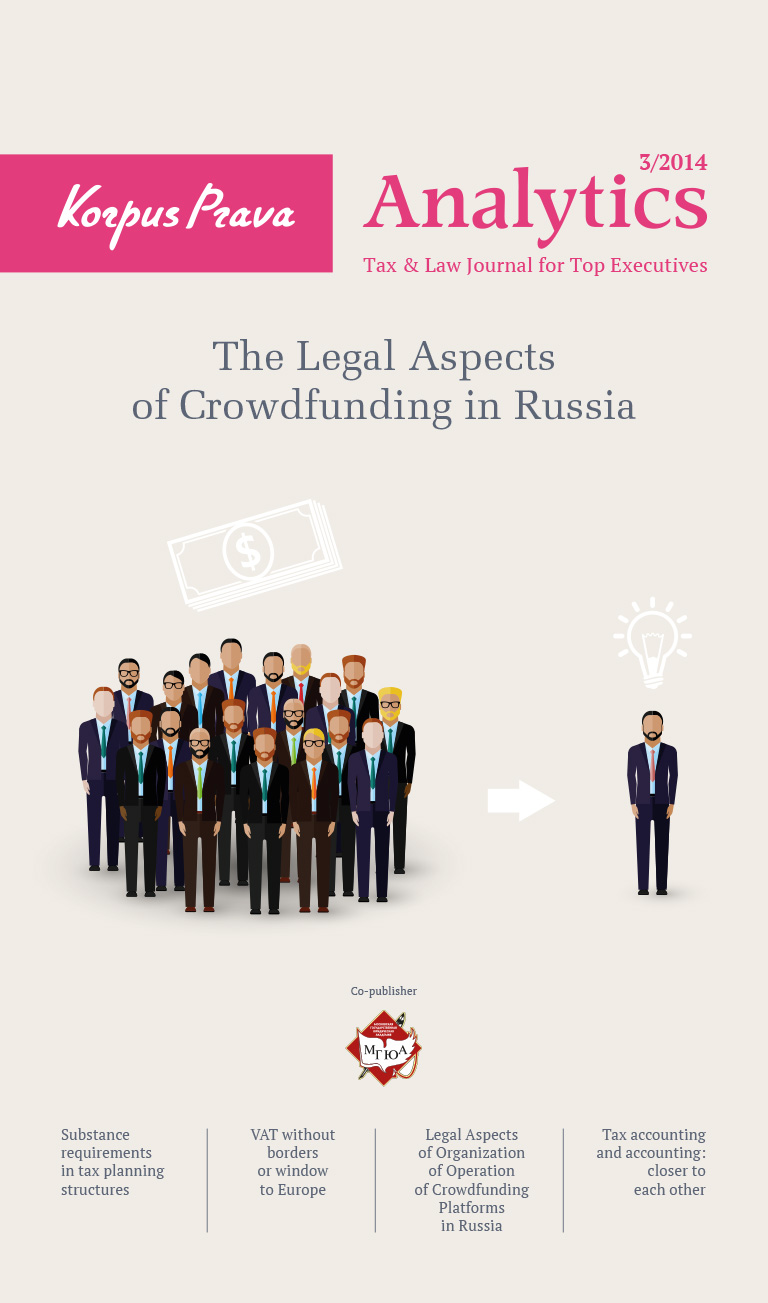- Cyprus Citizenship Scheme for Foreign Investors
- Squeezed But Pleased: Taxation of Passive Income in the European Union
- VAT Without Borders or Window to Europe
- Legal Aspects of Organization of Operation of Crowdfunding Platforms in Russia
- Substance Requirements in Tax Planning Structures
- “Deposit Splitting” of Individuals. Legal Civil and Criminal Aspects
Capital amnesty. Version 2.0
In February 2018, a set of laws aimed at prolongation of the capital amnesty procedure was adopted and became effective.
Particularly, the following legal acts were adopted, and it marked the continuing campaign on deoffshorization and amnesty of the Russian capital:
- Federal Law No. 33-ФЗ dated 19.02.2018 “On Amendments to the Federal Law “On Voluntary Declaration of Assets and Bank Accounts (Deposits) by Individuals and Amendments to Particular Legal Acts of the Russian Federation” (hereinafter – Law No. 33-ФЗ);
- Federal Law No. 34-ФЗ dated 19.02.2018 “On Amendments to Part One and Two of the Tax Code of the Russian Federation (Income Taxation of Foreign Companies under Control and Foreign Organizations)” (hereinafter – Law No. 34-ФЗ);
- Federal Law No. 35-ФЗ dated 19.02.2018 “On Amendments to Article 76.1 of the Criminal Code of the Russian Federation” (hereinafter – Law No. 35-ФЗ).
The first amnesty stage lasted from July 1, 2015 to June 30, 2016. Following the results of the first stage, taxpayers (subject to provisions of the amnesty law granting guarantees and preferences) are divided into the following groups:
- 1 group: taxpayers that used guarantees and filed special tax returns as part of the 1st stage (according to various public sources, the number of filers amounted from 2.5[1] to 7.2[2] thousand people);
- 2 group: radical group of taxpayers that refused to provide their personal data and details of their property as part of deoffshorization, and moreover, they changed their tax residency by leaving the Russian Federation (in mid-2017, Reuters agency reported that the deoffshorization policy in Russia failed, and a number of large businessmen withdrew from Russian tax residency after the Law “On Deoffshorization” became effective. Quoting the source close to the Kremlin, the agency stated that by its estimates nearly one-third of 500 wealthiest Russian businessmen left the country upon the adoption of the law on deoffshorization);
- 3 group: the remaining part (majority) of taxpayers that took a wait-and-see approach being guided by the principle ‘no good deed goes unpunished’, and did not use guarantees and exemptions offered by the government.
As one of the arguments, the third group expressed assurance that Russian regulatory authorities would not have an instrument of getting data from abroad, that services of automatic data exchange would not work, and that in the end, everything would remain unchanged.
However, under current circumstances when:
- The Russian Federation started to develop the legal base for integration into data exchange procedures;
- More than 70 countries confirmed (by signing bilateral agreements) their willingness to provide information to Russian tax authorities as part of automatic data exchange;
- Active works are underway to develop and integrate software that would let Russia join automatic data exchange, arguments and hopes of third group taxpayers are undoubtedly proven wrong.
Let us review some key aspects and peculiarities of filing tax returns set out by new amendments.
What may be specified in the special tax return?
As usual, the same as in compliance with the first stage, one may specify data on:
- Property held or actually owned as of the filing date by the filer, including:
- Land plots, other real estate;
- Vehicles;
- Securities, including stocks, shares and equity interest in share (joint-stock) capital of Russian and/or foreign companies.
- Foreign companies under control, where the filer acts as a controlling person as of the filing date (in case of indirect or latent participation in the share capital of such company).
- Individual accounts (deposits) at banks outside the Russian Federation.
- Accounts (deposits) at banks, in case the filer is declared a beneficiary of the account (deposit) as of the filing date.
The new feature in terms of objects for declaration purposes is an opportunity to declare not only foreign accounts open as of the filing date (as before), but also accounts already closed by the filing date. The only requirement is as follows: accounts have to be opened before 01.01.2018.
Who may file special tax returns?
Any individual regardless of their citizenship or tax residency may file a special tax return. Moreover, filing a special tax return as part of the first stage does not prevent them from filing a special tax return as part of the second stage. The filer may deliver a tax return in person or by proxy acting under the notarized power of attorney. However, filing a tax return by post is not stipulated by the law.
Where to file tax returns?
According to adopted innovations, a tax return may be filed to any tax authority upon the filer’s choice (previously, tax authority at the filer’s place of residence/registration) or to the central office of the Federal Tax Service of Russia.
Filing term for special tax returns
A special tax return may be filed as part of the second amnesty stage within the time period from March 1, 2018 to February 28, 2019.
What guarantees are granted upon filing a special tax return?
Guarantees granted to the filer include exemption from criminal, administrative and tax liability for a number of crimes/offences committed during acquisition, use or disposal of property and/or foreign companies under control, as well as during crediting bank accounts (deposits).
Exemption from criminal liability covers the following crimes:
- Evasion of obligations on repatriation of cash in foreign currency or the currency of the Russian Federation (Article 193 of the Criminal Code of the Russian Federation);
- Evasion of customs payments charged for individuals and legal entities on a large scale (Parts 1 and 2, Article 194 of the Criminal Code of the Russian Federation);
- Evasion of tax and/or duties charged for individuals (Article 198 of the Criminal Code of the Russian Federation);
- Evasion of tax and/or duties charged for legal entities (Article 199 of the Criminal Code of the Russian Federation);
- Failure to perform tax agent’s obligations (Article 199.1 of the Criminal Code of the Russian Federation);
- Concealment of cash or property held by the company or individual entrepreneur subject to collection of taxes and/or duties (Article 199.2 of the Criminal Code of the Russian Federation).
Exemption from administrative liability is limited to the following administrative offences:
- Carrying out business activities without state registration or without a special permit/license (article 14.1 of the Code on Administrative Offences of the Russian Federation);
- Carrying out illegal foreign exchange transactions on declared foreign accounts (part 1, article 15.25 of the Code on Administrative Offences of the Russian Federation);
- Untimely submission to the tax authority (or failure to submit in due time) of a notification on bank account (deposit) opening (closing) or changes to account (deposit) details at the bank located outside of the Russian Federation (parts 2, 2.1, article 15.25 of the Code on Administrative Offences of the Russian Federation).
Besides, the filer is exempt from the tax liability for:
- Failure to pay taxes, in case such tax obligation was imposed on the filer and/or another person before January 1, 2018 for carrying out of transactions related to acquisition, use or disposal of property and/or foreign companies under control, for the failure to file notifications on its participation in a foreign company and on a foreign company under control, as well as crediting bank accounts (deposits) reported in a special tax return;
- Failure to meet due terms for filing a notification on foreign companies under control (part 1, article 129.6 of the Tax Code of the Russian Federation);
- Failure to meet due terms for filing a notification on the participation in foreign companies (part 2, article 129.6 of the Tax Code of the Russian Federation).
Peculiarities of guarantees
It should be noted, that guarantees regarding tax exemption (collection of tax arrears) do not exempt from taxes on retained earnings of foreign companies under control.
Moreover, tax arrears accumulated before 01.01.2018 are not subject to collection. Given that the due term for personal income tax expires on July 15 of the year following the year of income gain, an individual may be granted income tax exemption as part of amnesty only for income gained before 31.12.2016. In case income was gained during 2017, then an obligation to declare and pay taxes appeared in 2018, therefore, such transactions are not covered by guarantees.
As for the exemption from liability for illegal foreign exchange transactions on foreign accounts reported in the tax return, all transactions carried out on such accounts before filing a tax return are deemed legal.
Key differences between the first amnesty stage and the second one are presented in the table below:



Prolongation of tax-free liquidation
Amnesty was not the only procedure prolonged by the legislator. One more procedure closely connected with the process of deoffshorization was prolonged, i.e. tax-free liquidation of foreign companies under control.
The said procedure makes it possible to liquidate any foreign company under control with no adverse consequences for the controlling person and receive assets of such company. Acquisition of such assets is not recognized as personal income for tax purposes, and upon future re-sale of such assets such individual may apply tax deductions (tax base reduction by the asset value determined in accordance with accounting records of the liquidated foreign company under control as of the liquidation date).
Earlier, the deadline for liquidation of a foreign company under control and acquisition of assets tax-free was set until 01.01.2018.
Adopted amendments prolong this procedure until 01.03.2019.
Besides, earlier exemption on tax-free liquidation covered only property (cash excluded), while now cash is also recognized as assets which may be acquired by the controlling person tax-free upon the liquidation of a foreign company under control.
Without any doubt, adopted amendments are treated as favourable because they enhance opportunities of taxpayers to use guarantees and indemnities. Nevertheless, the rationale for participation in the second amnesty stage, as well as implementation of tax-free liquidation procedure, may be determined only after a detailed analysis and review of such factors as the structure of assets, history and procedure of their acquisition, exposure to liability risks and their valuation, etc.
[1]https://www.vedomosti.ru/economics/articles/2017/12/22/746232-amnistiyu-kapitalov.
[2]https://www.rbc.ru/newspaper/2018/02/01/5a71d7fd9a79470410e91497.
Your subscription to our journal will definitely boost the efficiency of your specialists and downsize your expenses for consultants.
The journal is available free of charge in the electronic version.
Free Download

